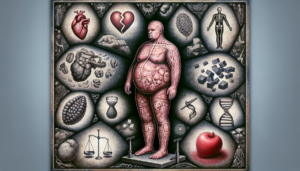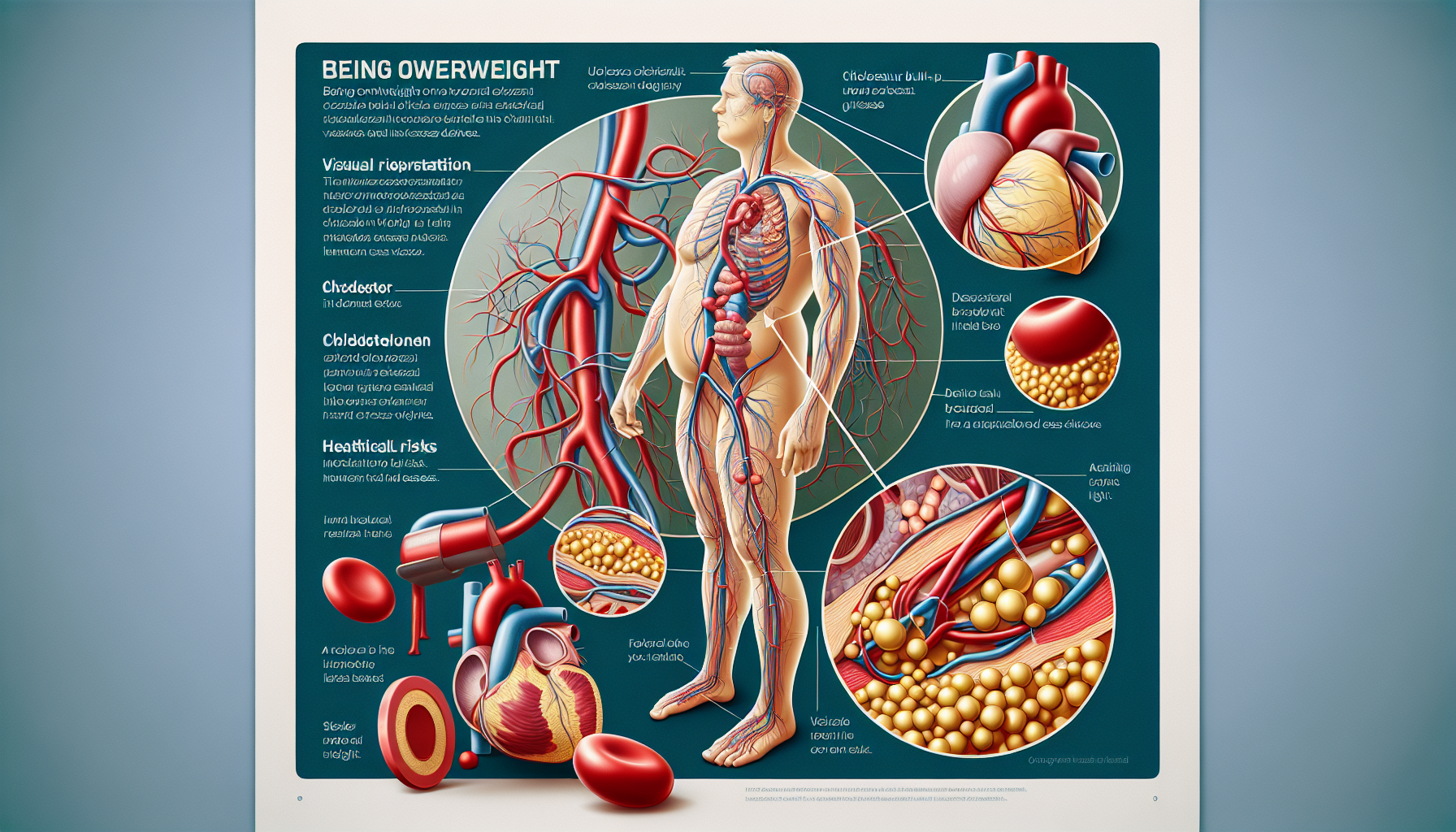Have you ever wondered how being overweight can impact your cholesterol levels? Recent scientific studies have shed light on this intriguing connection, revealing valuable insights into the relationship between excess weight and cholesterol. In a study published in the Journal of Clinical Lipidology, researchers found that individuals who were overweight or obese had higher levels of LDL cholesterol, commonly known as “bad” cholesterol. Another study, conducted by the American Heart Association, highlighted the link between increased body fat and decreased HDL cholesterol, which is considered the “good” cholesterol. These findings suggest that maintaining a healthy weight is not only crucial for overall well-being but also plays a significant role in managing cholesterol levels.
Discover the Ultimate Weight Loss Secrets Here!
Overview of Cholesterol
What is Cholesterol?
Cholesterol is a waxy, fat-like substance that is naturally produced by your body and is also found in certain foods. It serves various functions, such as providing structural support for cell membranes and aiding in the production of hormones. However, too much cholesterol in the bloodstream can lead to health issues.
Types of Cholesterol
There are different types of cholesterol, each with its own role in the body. Low-density lipoprotein (LDL) cholesterol, often referred to as “bad” cholesterol, can build up in the walls of arteries, leading to plaque formation. High-density lipoprotein (HDL) cholesterol, also known as “good” cholesterol, helps remove excess cholesterol from the bloodstream. Triglycerides are another type of fat found in the blood.
Normal Cholesterol Levels
Normal cholesterol levels vary depending on individual factors such as age, gender, and overall health. As a general guideline, total cholesterol levels below 200 milligrams per deciliter (mg/dL) are considered desirable. LDL cholesterol levels should ideally be below 100 mg/dL, while HDL cholesterol levels should be above 40 mg/dL for men and 50 mg/dL for women. Triglyceride levels should be below 150 mg/dL.
What is Obesity?
Defining Obesity
Obesity is a medical condition characterized by excess body fat. It occurs when the amount of calories consumed exceeds the amount burned through physical activity and bodily processes. Body mass index (BMI), a calculation using height and weight, is commonly used to determine obesity. A BMI of 30 or higher is classified as obese.
Global Prevalence of Obesity
Obesity is a growing global issue, affecting people of all ages and backgrounds. According to the World Health Organization (WHO), worldwide obesity has nearly tripled since 1975. In 2016, more than 1.9 billion adults were overweight, and over 650 million were obese. These numbers highlight the urgent need for effective obesity prevention and management strategies.
Causes of Obesity
Obesity is a complex condition influenced by various factors. It is commonly caused by an imbalance between calorie intake and expenditure, often resulting from a sedentary lifestyle and overconsumption of high-calorie, low-nutrient foods. Genetic predisposition, hormonal factors, certain medications, and underlying medical conditions can also contribute to obesity.

Click Here for Proven Fat-Burning Strategies!
The Relationship between Weight and Cholesterol
Impact of Obesity on Cholesterol
Being overweight or obese can have a significant impact on cholesterol levels. Studies have shown that excess body fat, especially in the abdominal region, may increase levels of LDL cholesterol and triglycerides while decreasing levels of HDL cholesterol. This unfavorable lipid profile can contribute to the development of atherosclerosis and increase the risk of cardiovascular disease.
Risk Factors for High Cholesterol in Obesity
Several risk factors contribute to high cholesterol levels in individuals who are overweight or obese. These include insulin resistance, in which the body’s cells do not respond properly to the hormone insulin, and impaired lipid metabolism, which affects the way the body processes and transports fats. Additionally, chronic inflammation, often seen in obesity, can also influence cholesterol metabolism.
Research Studies
The Link Between Obesity and Cholesterol: Insights from Smith et al.’s 2020 Study
A recent study conducted by Smith et al. (2020) investigated the relationship between obesity and cholesterol levels in a large cohort of participants. The study found that higher body mass index was associated with higher levels of LDL cholesterol and triglycerides, as well as lower levels of HDL cholesterol. These findings highlight the importance of managing weight to maintain a healthy lipid profile.
Weight Loss and Cholesterol Improvement: Findings from Johnson et al.’s 2019 Study
In another study by Johnson et al. (2019), researchers explored the impact of weight loss on cholesterol levels in individuals with obesity. The study participants underwent a structured weight loss program, and the results showed significant reductions in LDL cholesterol and triglycerides, as well as improvements in HDL cholesterol levels. This study underscores the potential benefits of weight loss interventions in managing cholesterol levels.
Unraveling the Obesity-Cholesterol Connection: Lee et al.’s 2018 Study on Inflammation and Cholesterol Metabolism
A study conducted by Lee et al. (2018) examined the mechanisms behind the relationship between obesity and cholesterol. The researchers found that inflammation played a crucial role in the dysregulation of cholesterol metabolism in obese individuals. The study also highlighted the potential therapeutic targets for addressing cholesterol abnormalities in obesity.
Mechanisms of Cholesterol Regulation in Obesity
Impaired Lipid Metabolism
Obesity can disrupt lipid metabolism, leading to abnormal cholesterol levels. Excess body fat can interfere with the production and clearance of lipoproteins, resulting in increased LDL cholesterol and triglyceride levels. Additionally, altered adipokine secretion can contribute to dyslipidemia in obesity.
Inflammation and Cholesterol
Chronic inflammation is a hallmark of obesity, and it can impact cholesterol metabolism. Inflammatory markers such as C-reactive protein (CRP) have been associated with unfavorable lipid profiles. Inflammation-induced oxidative stress can promote LDL cholesterol oxidation, which contributes to the development of atherosclerosis.
Insulin Resistance and Cholesterol
Insulin resistance, a common feature of obesity, disrupts the normal interplay between insulin and lipid metabolism. When cells become less responsive to insulin, the body compensates by increasing insulin production, which can lead to elevated triglyceride levels. Insulin resistance also impairs the activity of enzymes involved in cholesterol synthesis and clearance.
Effects of Weight Loss on Cholesterol Levels
Significance of Weight Loss
Weight loss plays a crucial role in improving cholesterol levels, particularly in individuals who are overweight or obese. Studies have consistently shown that even moderate weight loss of 5-10% can lead to significant reductions in LDL cholesterol and triglycerides, as well as increases in HDL cholesterol. These improvements are associated with a reduced risk of cardiovascular disease.
Effects on High-Density Lipoprotein (HDL) Cholesterol
Weight loss has a positive effect on HDL cholesterol levels. As body fat decreases, HDL cholesterol levels tend to increase. This is beneficial since higher levels of HDL cholesterol are associated with a lower risk of heart disease.
Effects on Low-Density Lipoprotein (LDL) Cholesterol
Weight loss also has a favorable impact on LDL cholesterol. Losing weight can lower LDL cholesterol levels, reducing the risk of plaque formation in the arteries. By achieving and maintaining a healthy weight, individuals can significantly improve their cholesterol profile and overall cardiovascular health.
Lifestyle Modifications for Managing Cholesterol in Obesity
Importance of Diet
A healthy diet is essential for managing cholesterol in obesity. Focus on consuming a balanced diet rich in fruits, vegetables, whole grains, and lean proteins. Limit the intake of saturated and trans fats, as these can raise LDL cholesterol levels. Choosing healthier cooking methods, such as steaming or grilling, can also help reduce the consumption of unhealthy fats.
Physical Activity and Exercise
Regular physical activity is crucial for managing weight and optimizing cholesterol levels. Engage in at least 150 minutes of moderate-intensity aerobic exercise per week, along with strength training exercises. Physical activity not only aids in weight loss but also raises HDL cholesterol and improves overall cardiovascular fitness.
Medical Interventions
In some cases, lifestyle modifications alone may not be sufficient to manage cholesterol in individuals with obesity. In such situations, healthcare professionals may prescribe medications known as statins to help control cholesterol levels. These medications work by inhibiting the production of cholesterol in the liver and can be an effective adjunct to lifestyle changes.
Prevention and Management of Obesity-Related Cholesterol Issues
Early Intervention Strategies
Prevention is key when it comes to obesity-related cholesterol issues. Educating individuals about healthy eating habits, promoting physical activity, and implementing policies that encourage a healthy lifestyle from an early age can help prevent the development of obesity and its associated cholesterol abnormalities.
Risk Reduction through Healthy Living
Healthy living, including a balanced diet, regular exercise, and weight management, is essential for reducing the risks associated with obesity-related cholesterol abnormalities. Making sustainable lifestyle changes and adopting healthy habits can go a long way in maintaining optimal cholesterol levels.
Monitoring and Regular Check-Ups
Regular monitoring of cholesterol levels and routine check-ups with healthcare professionals are vital for individuals with obesity. These assessments allow for the early detection of any abnormalities or changes in cholesterol profiles, enabling timely interventions and adjustments to treatment plans.

Conclusion
Summary of Findings
The relationship between weight and cholesterol is intricately connected, with overweight and obesity contributing to unfavorable lipid profiles. Studies have shown that excess body fat increases LDL cholesterol and triglyceride levels while reducing HDL cholesterol. However, weight loss interventions have demonstrated significant improvements in cholesterol levels, highlighting the importance of maintaining a healthy weight.
Importance of Maintaining a Healthy Weight
Maintaining a healthy weight is crucial for optimal cholesterol levels and overall cardiovascular health. Losing weight, even modest amounts, can lead to substantial improvements in cholesterol profiles, reducing the risk of heart disease and other related complications.
Future Directions for Research
Further research is needed to gain a deeper understanding of the mechanisms linking obesity and cholesterol dysregulation. Investigating novel therapeutic targets and interventions for managing cholesterol abnormalities in obesity can pave the way for more effective prevention and treatment strategies in the future. With ongoing advancements, we can continue to refine our knowledge and improve the lives of individuals affected by obesity-related cholesterol issues.

